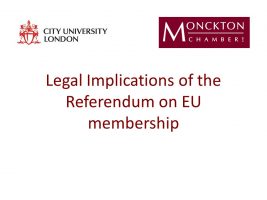The outcome of the promised in/out referendum on UK membership of the EU will be a landmark in the history of the United Kingdom.
Monckton Chambers and City University, London, have an established reputation as pivotal players in leading thinking on the legal implications of possible UK exit from the EU. At a symposium held on 2 December (the full agenda is available here), they built strongly on that reputation. Speakers covered in depth a range of highly topical questions, policy and legal.
Keynote policy speakers.
The two headline speakers were:
•Jonathan Faull, who heads the EU task force which has strategic oversight of the negotiations with the UK on its aim of reforming its relationship with the EU; and
•Lord Hannay, an independent peer, formerly the UK’s permanent representative to the European Community and to the United Nations.
Lord Hannay set the scene for the run up to an EU referendum, reminding attendees that “[the] legal consequences [of the referendum] do matter enormously; they need to be explained in language comprehensible to the non-practitioner; and they do need to be understood by the electorate before they vote, because our prosperity and our security depend on the rule of law”.
Mr Faull covered the state of the negotiations, basing his comments on David Cameron’s letter to Donald Tusk. The probability is that the UK renegotiation will reach the Council in early 2016.
Legal contributors
In response to Lord Hannay’s invitation, an array of leading lawyers spoke, namely:
- Sir Alan Dashwood of City University, London, Law School;
- Three Queen’s Counsel from Monckton Chambers (Paul Lasok, Philip Moser and Ian Rogers );
- Professors Paul Craig, Catherine Barnard and Kenneth Armstrong from Oxford and Cambridge Universities.
Points, legal and policy, arising in the debate included:
- A series of confessional meetings have been held with the other 27 Member States and the European Parliament. Different states have different views and different constitutional constraints and processes. It is doubtful whether there is any appetite for treaty change at this stage of the political cycle in a number of Member States. The UK’s wish list in the Cameron letter is silent as to whether treaty change is a necessary pre-requisite.
- The probability is that an agreement can be reached on how to handle the totemic issue of “ever closer union” although an opt out would require treaty change. Short of that, there could be a declaration as to its meaning, possibly binding in International Law. Meantime, it seems unlikely that the phrase provides a legal basis for legislative action.
- An enhanced role for national parliaments is possible. There are fault lines in the current rules, such as the short deadline for submission of reasoned opinions by parliaments which preclude substantive discussion among EU legislatures. Is there a place for a stronger deregulatory approach in the EU, such as a commitment to repealing or withdrawing legislation, or codifying it?
- The question of workers’ benefits is very complex and difficult. Measures which undermine the free movement of workers will be an uphill struggle to negotiate. Direct discrimination cannot be justified. But the scale of movement of migrant workers was not adequately predicted. So could there be negotiable measures that, while they might amount to indirect discrimination, might nonetheless be justifiable and proportionate?
- The substitutes under consideration for a future relationship between the UK and the EU include the EEA, a Swiss-style agreement or a free trade agreement. But an EEA model, favoured by some senior UK politicians , would result in serious disadvantage to the UK , namely that it would be excluded from the negotiating table;
- Even if “full” Brexit were to happen, many regulations and directives are likely to be retained. Indeed they will have to be retained if UK entities wish to continue to trade with Single Market states. Thus even if the UK were to leave, the key tenets of Procurement Law and Competition Law are likely to remain, not least because, as a trading nation, the UK is bound by its international legal obligations in those fields .
- The repeal of the Human Rights Act raises a variety of legal issues. An enduring question will be the extent to which EU citizens will enjoy acquired rights in the UK; indeed there is a further question how UK citizens, resident in other Member States, will be treated.
In his closing remarks, Jonathan Faull outlined the likely developments between now and the Council meeting at which a full substantive discussion will take place, possibly February 2016. Any future agreement might be reflected in a range of instruments, such as declarations, agreements binding in International Law and (as necessary) EU legislation.
The symposium on 2 December follows the seminar that Monckton held on 24 June (read here) and other relevant presentations made by members of chambers, including in other EU Member States (read here).
The symposium was convened by Christopher Muttukumaru CB of Monckton Chambers and by Professor Panos Koutrakos, Jean Monnet Professor of European Law, City University, London.
